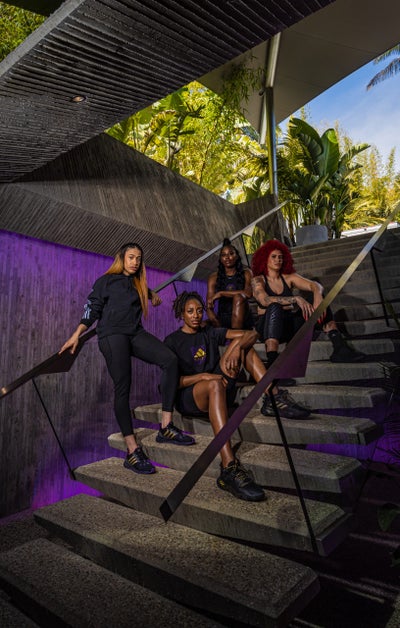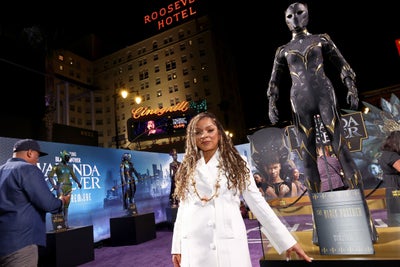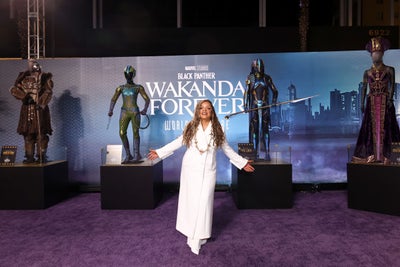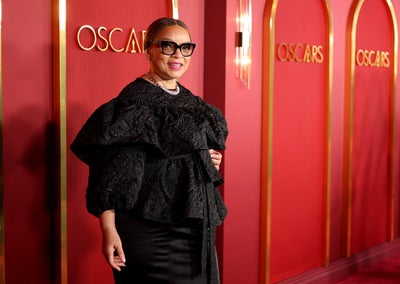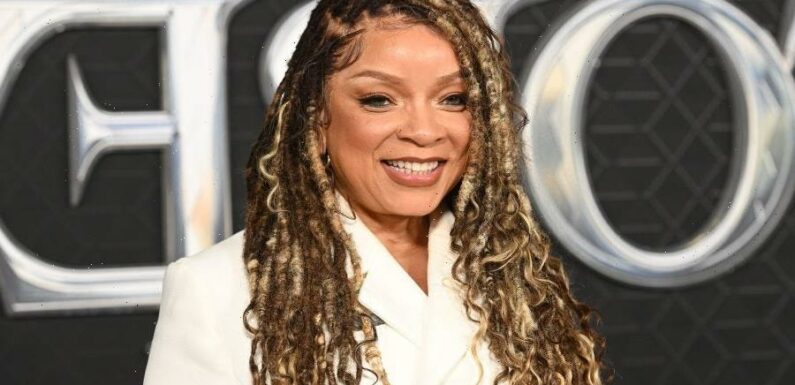
Ruth Carter is the blueprint, and you can [at] me because I’m quite confident that there are millions of others who think the way I do. Fearless, confident, and gracious, the visionary that is the living legend, Ruth Carter. She is one of one and has paved the way for many. From the famed, Spike Lee joints School Daze and Do The Right Thing to BET’s Being Mary Jane and the highly-anticipated revival of Coming 2 America, the proud Hampton University graduate has amassed over 40 costume designing credits to her name and hasn’t shown any sign of slowing up in the near future. In fact, she was recently tapped to return to the Marvel Cinematic Universe to design costumes for project record-breaking blockbuster Black Panther: Wakanda Forever.
For the Letitia Wright-starring sequel, which hits theatres everywhere this coming Friday, November 11, adidas partnered with Disney and Marvel to bring forth one-of-a-kind costuming featuring exclusive adidas innovation and futuristic technology. In the realm of the Afrofuturistic thematics illustrated through the original Black Panther movie, adidas joined forces with the Oscar-winning costume designer to re-launch adidas Community as a platform that empowers and elevates Black and brown communities through access and opportunity in sport, creativity, purpose, and business.
“The incomparable Ruth E. Carter is a living legend in this industry. I grew up watching her creations on the big screen in some of my favorite films, including Do The Right Thing, Malcolm X, Baby Boy, and Love & Basketball,” Cheresse Thornhill-Goldson, Design Director at adidas S.E.E.D. (School for Experiential Design) told ESSENCE. “She has absolutely forged the blueprint for not only costume designers but creatives from all disciplines on how to craft creations rich in detail, color, texture, and form that transport the viewer into a fully immersive experience of the narrative it faithfully depicts. We learned so much from her.”
For Goldson, what inspires her the most about Carter is “her generosity” and willingness to share her expertise and knowledge when aspiring creatives. While bringing the Wakanda Forever costumes to life, she described the creative process with Carter as a “collaborative endeavor” alongside members of the adidas innovation design team across footwear and apparel. Carter and the team were scattered across the world from Atlanta, Brooklyn, and Portland right here in the United States to Germany and Asia across the ocean, but the collaborative minds and efforts came together during the height of the pandemic last year to bring moviegoers costuming that they’ll never forget. Goldson recalled, “Ruth kicked off our design process by visually communicating the plot of the film so we could place ourselves ‘in the shoes’ of the characters and create from a place of empathy and compassion. She shared inspirational images and mood boards of ideas she curated.”
“We were all encouraged by Ruth to unleash our imaginations and let them run wild without the limitations of our traditional product creation process and considerations of producing products for today,” Goldson added. “We were encouraged to stretch our imaginations to create for the prominent female superheroes of Wakanda – Shuri, Okoye, and Riri Williams – a land rooted in technological advancements in performance and style.”
For Goldson, being part of the innovation team that collaborated with Carter on the Wakanda Forever wardrobe was more than an assignment on the job but a cultural reset for the cinematic universe beyond Marvel Studios. “Black Panther was not just a film, although a fictional story, it truly became a cultural phenomenon that BIPOC people all over the diaspora could identify with and rally around. It was such a privilege for our S.E.E.D. design team to participate in designing the costumes for the sequel. It’s not enough to just have Black designers in the room, but we must play an active role in leading and directing the way we are depicted on-screen to ensure we are speaking to ourselves and the world in the most authentic and aspirational way. Images are powerful and can either uplift or tear down one’s image of self and community. It’s of the utmost importance that we lead the depiction of stories that impact our sense of self and communicate who we are in this generation and for generations to come,” she added.
Ahead of the premiere of Black Panther: Wakanda Forever, ESSENCE exclusively caught up with Carter about her thoughts on her career trajectory throughout the years, her first-ever experience watching the film back through the lens of a costume designer, and the importance of having a style and fashion team of color when creating our stories.
ESSENCE: What was your ‘aha’ moment when you realized that you wanted to pursue costume design professionally?
Ruth Carter: “I always loved the stories of Black culture from Langston Hughes to James Baldwin to A Raisin in the Sun, Sty the Blind Pig. I have a lifetime of mentors who introduced me to Black literature, Black theater, and the playwrights that were writing the place. I loved the Negro Ensemble Company. When I was thinking about going to college, I wanted to be an actress, actually, and perform some of the work that I read, so my ‘aha’ moment came when I did costumes for a play in college. I realized that I could be a part of all of the characters, not just portray one of them, [and] that I had an opportunity to research the culture for that specific story and bring to fruition what I imagined life would be like. Whether it was in the ’40s and ’50s, ’60s for Malcolm X, or doing the story of Rosewood with John Singleton, I realized that I had been groomed to tell stories of culture, and I’ve spent my whole life doing it.”
What was the most exciting part of working on Black Panther: Wakanda Forever for you?
“I grapple with weighing what was more exciting than the next because this is a celebration and a tribute to Chadwick [Boseman] and the way he poured himself into the first movie. We had to continue the story, but bringing a new culture of the Talokans that was inspired by the Mayans and working with a great actor like Tenoch [Huerta], who portrayed Namor, and he was the perfect ambassador for the culture. Making his costume was another dream come true with the amount of storytelling and research that went into every aspect of his costume, and the way he carried it underwater really felt incredible. It felt like another ‘aha’ moment, another accomplishment of how to show culture in its true beauty.”
How did working on Wakanda Forever challenge you as a costume designer and unlock the next level in your career?
“Well, I was inspired to tell a story, and we had to learn a lot. It wasn’t like for Black Panther [where] I had been a part of this culture, so wasn’t starting from the beginning. I had a running start with the facts. With the Talokan, we were creating a brand new culture from scratch that lived underwater, and we actually shot underwater a lot. We had a 20-foot tank on the John Singleton Stage here at Tyler Perry Studios, and that was very challenging because we would create these beautiful underwater costumes that represent the Mayans, and the water would just destroy them. Even after a test, we couldn’t use that same costume again because we learned so much from the tests, and they spent hours in the water. We had to create them all over again and do different kinds of weights in the costumes to keep them floating in the way that we wanted them to float. I think this was the hardest film I have ever done.”
When you finally got a chance to watch Black Panther: Wakanda Forever, what were your authentic initial reactions to the film?
“That’s not a fair question for me because I am the keeper and the creator of these costumes, and I have a personal connection to everything you see on screen. We built something for one purpose, and then the purpose might have changed, and the costume was very intricate, so watching it was me trying to piece the puzzle back together the way that it was intended. That’s a crazy answer, but I’m like under siege when I first watch it because I’m looking at everything. I’m also on the journey of the story, but not how fresh eyes are. I’m on a journey of seeing what happened next.
“My reaction when I first see Queen Ramonda is like, ‘she looks so beautiful and so regal,’ then I go, ‘oh, but wait, that shot’s over, now here’s the next shot.’ I’m like, ‘wow, the Dora Milaje and their new armor, it really does work.’ I am both in the story and outside of the story, and it’s not until I see it, maybe the fifth time, that I can relax. Just get into the story. Just go on the ride, stop looking for things. It’s tough. Artists are that way. They’re never finished, and that’s true for me. It’s never finished. I could crawl up on that screen and fix something if I could.”
Walk me through your creative process with adidas. How hands-on were you with the team – 70/30? 80/20? 50/50?
“I think it was 70/30, which 70 on my end, and 30 that went in ways on their end. We were open to hearing new ideas and new inspirations, but they still had to work within the context of the script that I was doing and the story that we were telling collectively, which they could only go through me. We had to give Shuri the royal color of purple. We also wanted a certain dynamic aspect to the costume when she rides the motorcycle, so we wanted it to feel a little like a cape in the back, and we gave it a swing back. It’s like a 1940s back, and we wanted to be innovative because it’s Shuri, and she’s the head of the Wakanda Design Group, so there were parameters that we had to design around.
“Working with them was incredible. I was so impressed with how they committed and how they communicated their ideas. At times, I didn’t feel like I was talking to students of design. I felt like I was talking to designers and that they had so much to offer. It was no different than me talking to any other high-end design firm and their representatives. They stepped up to the plate, they offered great ideas, they listened, and that’s how I think it became so successful.”
When you do get a chance to sit back and look at all the work you’ve done, how proud are you of yourself? What do you do to lift up other Black women and girls as you climb in the costume design space?
“I’m inspired, and I’m proud to continually tell a story through costume about culture that brings media meaning to audiences and to other inspiring costume designers. I had mentorship coming up, and I value the mentorship that I had. It was so incredible that I only wish to be that for other aspiring costume designers. I feel that I am standing in the footsteps of the mentors that I had to pat to pay it forward.”
Why is it important to have Black folks, especially Black women, in the room when it comes to costume design?
“Well, this film is a female force, female leads, and female strength to defend the nation of Wakanda, and these women were on screen and also behind the camera. You have Hannah Beachler, the production designer. You have Autumn, our DP, you have myself as the costume designer, and then you have this team from S.E.E.D. that is about women, Black and Brown, designing on this platform. The story itself holds so much power for women. There are costumes that were meant to exhibit that strength. You see the dress that Queen Ramonda wears with one arm exposed, for me, that was designed to express femininity, power, strength, vulnerability, and leadership in your own way, within your own look, your own terms. The S.E.E.D. Program also exhibits that same strength to show that leadership, that vulnerability of being new to the game, but also the intellect and the strength to bring ideas to the table. It was a collaboration that should have been, there’s no doubt about it.”
Black Panther: Wakanda Forever is officially in theatres on Friday, November 11. Check out the official trailer for the Marvel Studios sequel below.
https://youtube.com/watch?v=_Z3QKkl1WyM%3Ffeature%3Doembed
Source: Read Full Article
